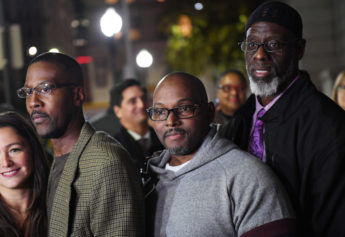
In Chicago, 15 men who had spent years in prison on wrongful convictions were exonerated on November 16. The men were framed by a corrupt group of police officers who planted drug evidence on them. This represents the first mass exoneration in the history of Cook County, whose State’s Attorney, Kim Foxx, is a Black woman elected on a platform of criminal justice reform. (Photo: Wikimedia Commons)
There are signs of a sea change in Chicago, long known as a center for police brutality and corruption. This is a city whose Black and low-income citizens have had much to fear from law enforcement over the years. Now Chicago has experienced its first mass exoneration of people who were framed by rogue police officers years ago on bogus drug charges and imprisoned since then.
In one day, a total of 15 men representing 18 cases were freed, their charges dismissed because of the handiwork of ex-Sgt. Ronald Watts, who maintained a criminal enterprise in full view of police brass and City Hall. Watts and his gang of officers framed these men between 2003 and 2008 by planting drugs on them. Watts is behind bars, and seven officers who worked with him are now on desk duty.
“What went on here was a criminal sergeant who used 7 to 10 willing participants to engage in what is nothing less than a criminal enterprise, his own criminal enterprise for a decade. What is perhaps the most remarkable and frustrating thing is this was an open secret throughout internal affairs and city hall,” said Joshua Tepfer, a lecturer in law at the Exoneration Project, lawyers for the freed men, in an exclusive interview with Atlanta Black Star. A project affiliated with the University of Chicago Law School, the pro bono legal clinic assists its clients with their claims of innocence by investigating and petitioning courts to reverse wrongful convictions.
“For them to turn a blind eye for so long and cover it up, when they knew they were framing people is incomprehensible to me and so sad, and shows why Chicago is the epicenter of police corruption,” Tepfer added, noting it is appalling that the officers who engaged in this misconduct are still allowed to testify in the courts.
Sgt. Watts and his crew engaged in their criminal behavior and made massive illegal arrests for a decade, according to Tepfer. “These were basically beat cops who didn’t wear uniforms, a tactical team that was roving around the South Side of Chicago —the projects, the most vulnerable part of our community, acting with impunity, without oversight.”
One of Watts’ victims is Ben Baker, who was arrested three times between 2004 and 2006 and was sentenced to 18 years, spending a decade in prison based on two wrongful convictions. After his name was cleared in 2016, Baker filed a federal lawsuit against the city of Chicago and 17 officers, including Watts, for planting drugs on the innocent man twice — once in retaliation for refusing to bribe Watts, and another time when Baker sought to expose the officers’ corruption. Although Baker had revealed these facts in his 2006 trial, his testimony fell on deaf ears. While the Cook County State’s Attorney’s Office was prosecuting Baker, the FBI and the Chicago Police Internal Affairs were investigating Watts and his tactical team for “an ongoing pattern of criminal misconduct against public housing residents,” which Chicago police knew since at least 2004.
In his suit, Baker alleges that had the Chicago officials provided him with this information, he would have used it to defend himself against the criminal charges and avoid conviction. Filed under Section 1983 of the Civil Rights Act of 1871 — the “Ku Klux Klan” Act — Baker’s complaint claims the defendants used their authority “under color of law and within the scope of their employment” to deprive Baker of due process and a fair trial through an unjust criminal conviction. Baker cited the city of Chicago policy and practice of “failing to properly train, monitor, investigate, and discipline misconduct by its police officers,” concealing exculpatory evidence from Baker and prosecutors, fabricating false evidence, and failing to take meaningful action to remedy the problem.
News of the mass exonerations comes as Cook County prosecutors have released and agreed to retry two men convicted of rape and murder in light of DNA evidence pointing to their innocence. Nevest Coleman and Darryl Fulton were sentenced to life in 1994 and had been behind bars until now. A semen sample found on the victim’s underwear has been linked to a serial rapist. In a history-making week in the country’s second-largest county, two other men were released — a man convicted of a 1990 double murder, and another who served 29 years for a deadly 1988 arson. Also this week, a federal judge sentenced Chicago police officer Marco Proano to five years imprisonment for firing 16 times into a car full of teenagers.
This flurry of liberation in Cook County comes courtesy of State’s Attorney Kim Foxx. Foxx, who came out of Chicago’s Cabrini-Green housing projects, moved up the ranks in the state’s attorney’s office, working for Anita Alvarez, the disappointing top prosecutor she eventually would unseat in 2016. While Alvarez was known for her coverup in the case of Laquan McDonald — the 17-year old Black boy who was executed by a Jason Van Dyke, a white officer, in 2015 — Foxx came to office as a reformer, to change the system, fight police corruption, and end the “tough on crime” approach that has filled the prisons with Black and Latino people yet has not made anyone safer.
Chicago Fraternal Order of Police President Kevin Graham condemned the exonerations, accusing Foxx and her staff of pandering to a “powerful anti-police movement in the city.” Tepfer notes that in these and other cases, there has been blowback from the FOP “But the reality is they can’t say anything about Watts, and they don’t because this is just police corruption. I didn’t have to rely on the words of citizens,” Tepfer said, but rather he relied on “whistleblowers, police officers, sworn statements from law enforcement, and FBI documents to see what was happening over a decade. … This should be widely accepted as the right thing to do. The individuals she surrounds herself with should be praised for setting up and doing something, and acknowledging that this is just the beginning.”
While the victims in this historic wave of exonerations feel vindicated, as Tepfer suggests, one takeaway from these mass exonerations is that for all the talk about crime in Chicago, police cannot solve crime if they mistreat the community. “Here we have law-abiding citizens who were trying to report what was happening. Not only were they ignored, but they were retaliated against for attempting to expose it,” he said. “When you think about what happened to people for over a decade, how do you blame people for not trusting police?” he added.
“Many of my clients attempted to come forward, and they were retaliated against by the police with false charges, beatings or both,” Tepfer offered. What the Exoneration Project’s clients want most of all is accountability for these corrupt officers. This most recent development coming out of Chicago may very well be a tipping point and a down payment for decades’ worth of injustices that must be made right.
“We are uncovering the scope of this scandal. There are roughly 500 convictions we have to examine based on these officers’ conduct,” Tepfer said. “This is really the beginning.”


